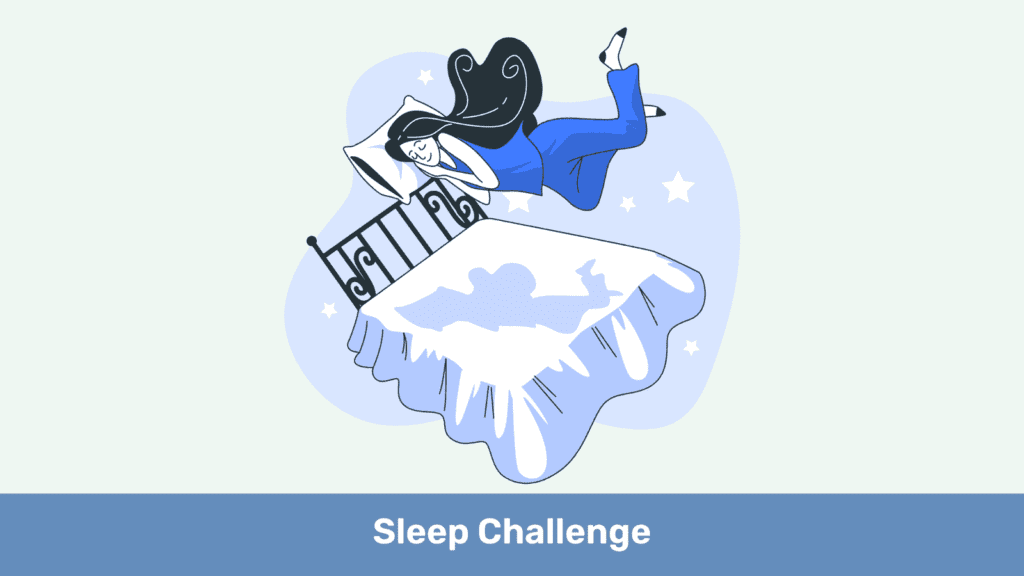Introduction
Introducing the “Sleep Challenge: 7 Nights to Renewed Rest,” your guide to transforming the way you sleep in just one week. In the hustle of everyday life, the importance of quality sleep can easily be overlooked, yet it remains an essential component of our health and well-being. This challenge is designed not just to increase the hours you spend asleep, but to significantly enhance the quality of your rest.
Over the next seven nights, we’ll explore and implement practical aspects of sleep hygiene. Each day is an opportunity to adopt new habits and make changes in areas like diet and evening routines, all contributing to improved sleep. From establishing calming pre-bedtime rituals to modifying your daily activities for better nighttime rest, we’ve got you covered.
Whether you’re struggling with occasional sleeplessness or looking to deepen the quality of your regular sleep, this challenge is crafted to offer insightful and practical solutions. Get ready to experience the profound impact that restful, rejuvenating sleep can have on your overall health and daily energy levels.
Preparing for the Challenge

Success in the “Sleep Challenge: 7 Nights to Renewed Rest” begins with proper preparation. Creating the right environment and mindset for sleep is crucial. This preparation phase is all about setting the stage for the transformative sleep practices you’ll be adopting over the next week.
Creating the Ideal Sleep Environment:
-
-
- Comfort is Key: Ensure your bedroom is a sanctuary for sleep. This means a comfortable mattress, supportive pillows, and bedding that suits your comfort level.
- Control the Atmosphere: Pay attention to the temperature, light, and noise levels in your bedroom. A cool, dark, and quiet room often promotes better sleep.
- Tech-Free Zone: Try to make your bedroom a technology-free zone. The blue light from screens can interfere with your natural sleep cycle.
-
Establishing a Pre-Sleep Routine:
-
-
- Wind Down: Develop a relaxing pre-sleep routine to signal your body it’s time to wind down. This could include reading, light stretching, or a warm bath.
- Limit Stimulants: Avoid caffeine and heavy meals close to bedtime. Opt for a light snack if you’re hungry.
-
Mentally Preparing for Better Sleep:
-
-
- Set a Sleep Schedule: Aim to go to bed and wake up at the same time every day to regulate your body’s internal clock.
- Mindfulness and Relaxation: Consider incorporating mindfulness or relaxation techniques to quiet your mind before bed.
-
Reducing Daytime Naps:
-
-
- If you’re accustomed to long daytime naps, try to limit them. Short, 20-minute naps can be refreshing without affecting your nighttime sleep.
-
As we step into this sleep challenge, remember that these initial changes are building blocks. They’re not just about the next seven nights; they’re about establishing habits that can lead to lasting improvements in your sleep quality and, consequently, your life.
Day 1: Establishing a Sleep Schedule

Day 1 of the “Sleep Challenge: 7 Nights to Renewed Rest” is about one of the most fundamental aspects of good sleep hygiene: establishing a consistent sleep schedule. Having a regular bedtime and wake-up time is crucial for aligning your body’s internal clock, or circadian rhythm, which plays a significant role in dictating your sleep patterns.
Setting a Consistent Bedtime and Wake-Up Time:
-
-
- Determine Your Schedule: Choose a bedtime and wake-up time that you can realistically stick to every day, including weekends. The key is consistency.
- Gradual Adjustments: If your current schedule is far off from your ideal times, make gradual adjustments, shifting by 15 to 30 minutes each night until you reach your goal.
-
Understanding Circadian Rhythm:
-
-
- Your Internal Clock: The circadian rhythm is like an internal 24-hour clock, cycling between sleepiness and alertness at regular intervals. It’s heavily influenced by external cues, especially light.
- Sync with Natural Cycles: Try to expose yourself to natural light in the morning and avoid bright light in the evening. This helps regulate your circadian rhythm, making it easier to fall asleep and wake up naturally.
-
Tips for Success:
-
-
- Evening Routine: Develop a relaxing evening routine that begins about an hour before your set bedtime.
- Morning Rituals: In the morning, engage in activities that signal your body it’s time to wake up, like opening curtains to let in light or doing some light physical activity.
-
Remember, establishing a consistent sleep schedule may take some time to adjust to, but it’s one of the most effective ways to improve your sleep quality. By the end of this first day, you should be on your way to developing a sleep pattern that works best for your lifestyle and health.
Day 2: Mindful Relaxation Techniques

On Day 2 of the “Sleep Challenge: 7 Nights to Renewed Rest,” we turn our attention to mindful relaxation techniques. These practices, such as meditation and deep breathing exercises, are excellent tools for calming the mind and preparing the body for sleep.
Introduction to Mindful Relaxation:
-
-
- Mindfulness and Meditation: These practices involve focusing your attention and slowing down your thoughts, which can be particularly beneficial before bedtime. They help in reducing stress and anxiety, common culprits of sleep disturbances.
- Deep Breathing: This simple yet effective technique can help lower your heart rate and relax your body. It’s an excellent way to ease into a state conducive to sleep.
-
Activity – Guided Relaxation Exercise:
-
-
- Find a Quiet Space: Before bedtime, find a quiet and comfortable spot where you can sit or lie down without any interruptions.
- Begin with Deep Breathing: Start by taking slow, deep breaths. Inhale through your nose, hold for a few seconds, and exhale through your mouth. Feel each breath as it moves through your body.
- Body Scan: Gradually move your attention through different parts of your body. Start from your toes and move upwards. With each breath, release tension from each part of your body.
- Mindful Meditation: Focus on the present moment. If your mind wanders to other thoughts, gently bring your attention back to your breathing or a chosen focus point.
- Conclude Gently: After 10-15 minutes of this exercise, slowly bring your awareness back to your surroundings. Notice the calmness in your body and mind.
-
Integrating these mindful relaxation techniques into your nightly routine can significantly improve the quality of your sleep. They not only help in quieting the mind but also signal to your body that it’s time to rest, setting the stage for a peaceful night’s sleep.
Day 3: Diet and Sleep

Day 3 of the “Sleep Challenge: 7 Nights to Renewed Rest” is dedicated to understanding the relationship between diet and sleep quality. What we eat and when we eat can have a significant impact on how well we sleep.
The Connection Between Diet and Sleep:
-
-
- Impact of Certain Foods and Drinks: Some foods and beverages can disrupt sleep, such as those high in caffeine or sugar, while others can promote better sleep, like those containing tryptophan or magnesium.
- Eating Times: Eating a heavy meal too close to bedtime can lead to discomfort and indigestion, making it harder to fall asleep.
-
Dietary Tips for Better Sleep:
-
-
- Foods to Enjoy: Include foods that are known to aid sleep. Options rich in tryptophan (like turkey and bananas), magnesium (such as almonds and spinach), and calcium (including dairy products) can promote better sleep.
- Foods to Avoid: Limit caffeine and sugar intake in the evening. These can keep you alert and disrupt your natural sleep cycle.
- Balanced Meals: Focus on well-balanced meals throughout the day. Overeating or consuming heavy, rich foods can lead to discomfort at night.
-
Importance of Sleep for Overall Health:
-
-
- While adjusting your diet for better sleep, it’s also important to remember the overall impact of sleep on your health. The Centers for Disease Control and Prevention (CDC) notes that getting less than 7 hours of sleep per night can increase the risk of chronic conditions like obesity, heart disease, diabetes, and depression. This statistic underlines the significance of not just diet, but also a holistic approach to health, including adequate rest.
-
Implementing these dietary changes can greatly enhance the quality of your sleep. Paying attention to both what you eat and when you eat can help you enjoy more restful nights and contribute to your overall well-being.
Day 4: Limiting Daytime Naps

On Day 4 of our “Sleep Challenge: 7 Nights to Renewed Rest,” we address the topic of daytime napping and its impact on nighttime sleep quality. While naps can be beneficial in refreshing your mind and boosting your energy, it’s important to manage them wisely to ensure they don’t interfere with your sleep at night.
Understanding Daytime Napping:
-
-
- The Double-Edged Sword of Napping: Short naps of about 20 minutes can be rejuvenating without affecting your nighttime sleep. However, longer or late-afternoon naps can disrupt your sleep cycle, making it harder to fall asleep at your regular bedtime.
- Timing is Crucial: Aim for early afternoon naps, preferably post-lunch, when there’s a natural dip in your circadian rhythms. Avoid napping after 3 PM as it can delay your ability to fall asleep at night.
-
Guidelines for Effective Napping:
-
-
- Keep It Short: Limit your naps to 15-20 minutes. This duration is enough to refresh you without entering deeper sleep stages that can lead to grogginess.
- Create a Restful Environment: Even for short naps, create an environment conducive to rest. Find a quiet, comfortable place where you can relax without interruptions.
- Consider a Nap Alternative: If you find that napping impacts your nighttime sleep, try other ways to rejuvenate in the afternoon, such as a brief walk, stretching, or a relaxing activity like reading.
-
Balancing Naps and Nighttime Sleep:
-
-
- Monitor Your Sleep Patterns: Pay attention to how napping affects your sleep at night. If you notice difficulty sleeping or changes in sleep quality, consider adjusting or skipping your naps.
- Consistent Sleep Schedule: Remember that maintaining a consistent sleep schedule is key. If you choose to nap, make sure it aligns with and supports this schedule.
-
On this fourth day of the challenge, take the time to assess how daytime napping fits into your overall sleep strategy. Adjusting your nap habits can be an essential step towards ensuring a full, restful night’s sleep.
Day 5: Physical Activity and Sleep

Day 5 of the “Sleep Challenge: 7 Nights to Renewed Rest” focuses on the relationship between physical activity and sleep. Engaging in regular exercise can significantly improve the quality of your sleep, helping you to fall asleep faster and enjoy deeper sleep.
Benefits of Regular Physical Activity for Sleep:
-
-
- Enhanced Sleep Quality: Regular physical activity, especially aerobic exercise, can increase the amount of time you spend in deep sleep, the most restorative phase.
- Reduced Stress and Anxiety: Exercise is a powerful stress reliever. Lower stress levels can lead to better sleep, as anxiety and stress are common causes of sleep problems.
- Regulation of Sleep Patterns: Engaging in regular exercise can help to regulate your body’s internal clock, especially if you exercise outdoors and are exposed to natural light.
-
Suggested Exercises for Better Sleep:
-
-
- Aerobic Activities: Incorporate light to moderate aerobic activities like walking, swimming, or cycling. These exercises can raise your heart rate and improve sleep quality.
- Yoga and Stretching: Gentle yoga or stretching in the evening can relax your muscles and calm your mind, preparing your body for sleep.
- Timing of Exercise: Aim to finish any vigorous workouts a few hours before bedtime, as exercising too close to bedtime can leave you too energized to fall asleep. However, gentle, relaxing exercises can be beneficial closer to bedtime.
-
Implementing Exercise into Your Routine:
-
-
- Consistency is Key: Try to include at least 30 minutes of physical activity most days of the week. Even short bursts of activity can accumulate to have a positive effect.
- Listen to Your Body: Pay attention to how different types and times of exercise affect your sleep. Adjust accordingly to find the best routine that aids your sleep.
-
On Day 5, take a step towards incorporating physical activity into your daily routine, not just for your overall health, but as an integral part of your strategy for better sleep. Regular exercise can be a natural and effective way to improve both your sleep quality and your overall well-being.
Day 6: Digital Detox

Day 6 of the “Sleep Challenge: 7 Nights to Renewed Rest” introduces a critical component to improving sleep quality – a digital detox. In an age where our lives are intertwined with digital devices, it’s important to understand how they affect our sleep and to take conscious steps to mitigate their impact.
The Challenge: Turning Off Electronic Devices Before Bed
-
-
- One-Hour Rule: The challenge for Day 6 is to turn off all electronic devices – smartphones, tablets, computers, and TVs – at least one hour before your bedtime. This includes refraining from checking emails, social media, or watching late-night shows.
- Creating a Pre-Sleep Ritual: Use this hour to engage in calming activities that help transition your body and mind into a state ready for sleep, like reading a book, listening to soft music, or practicing relaxation techniques.
-
Understanding the Impact of Blue Light
-
-
- Blue Light and Sleep Disruption: Electronic devices emit blue light, which can interfere with the production of melatonin, the hormone that regulates sleep-wake cycles. Exposure to blue light can trick your brain into thinking it’s still daytime, leading to difficulties falling asleep.
- Creating a Tech-Free Bedroom: Consider making your bedroom a tech-free zone, not just during this challenge but as a long-term practice. This can significantly improve your sleep environment.
-
Alternatives to Screen Time:
-
-
- Reflective Activities: Use the time you’d typically spend on devices for reflective activities like journaling or planning the next day.
- Relaxation Techniques: Engage in relaxation techniques such as deep breathing or gentle yoga to calm your mind and prepare your body for sleep.
-
On Day 6 of the challenge, by consciously disconnecting from our digital world, we allow our minds to unwind and prepare for a restful night’s sleep. Embrace this digital detox as an opportunity to find tranquility and mindfulness in your pre-sleep routine.
Day 7: Creating a Sleep Sanctuary

The final day of the “Sleep Challenge: 7 Nights to Renewed Rest” is about transforming your bedroom into a sleep sanctuary. The environment in which you sleep can have a profound impact on the quality of your rest. Today, we focus on optimizing your sleep space to promote a peaceful and restful night’s sleep.
Creating a Sleep-Friendly Environment:
-
-
- Comfortable Bedding: Invest in comfortable and supportive mattresses and pillows. The right bedding can make a significant difference in your sleep quality.
- Control the Light: Minimize light exposure in your bedroom. Consider using blackout curtains or an eye mask to block out light, especially if you live in an area with late evening sunlight or early morning brightness.
- Manage the Noise: If noise is an issue, consider using earplugs, a white noise machine, or a fan to drown out disruptions.
- Keep It Cool: The ideal temperature for sleep is between 60-67 degrees Fahrenheit (15-19 degrees Celsius). A cooler room can help signal your body that it’s time to sleep.
-
Implementing Changes to Your Sleep Space:
-
-
- Activity – Revamp Your Bedroom: Take a step today to make at least one change in your bedroom that will improve your sleep environment. This could be anything from decluttering and removing any work-related materials, to adding a plant for a touch of nature and cleaner air.
- Personal Touch: Add elements that make the space feel peaceful and relaxing to you. This could be soft colors, cozy blankets, or a few drops of a calming essential oil like lavender.
-
Creating a Routine Around Your Sleep Sanctuary:
-
-
- Reserve Your Bedroom for Sleep: Aim to use your bedroom primarily for sleep, which helps strengthen the association between your sleep space and rest.
- Evening Wind-Down: Spend the last part of your evening in this space doing relaxing activities that help signal to your body it’s time for sleep.
-
On this final day of the challenge, by creating a sleep sanctuary, you’re setting up a physical environment that supports your journey towards better sleep. This dedicated space can become a cue for your mind and body, signaling that it’s time to unwind and drift into a peaceful night’s rest.
Conclusion and Beyond
As we conclude the “Sleep Challenge: 7 Nights to Renewed Rest,” take a moment to appreciate the strides you’ve made in improving your sleep quality. This week has been a journey of learning and applying effective sleep habits, from establishing a consistent sleep schedule to creating an environment conducive to rest. The benefits you’ve experienced underscore the importance of good sleep hygiene for your overall well-being.
Sustaining Your New Sleep Habits:
-
-
- Continue to practice the techniques you’ve learned. Consistency is key in maintaining the improvements in your sleep.
- Be adaptable and responsive to your body’s needs, adjusting your routines as necessary to ensure restful sleep each night.
-
Long-term Commitment to Better Sleep:
-
-
- Remember, cultivating excellent sleep hygiene is an ongoing process. It’s about making lasting changes to your lifestyle.
- Platforms like Woliba can support you in this endeavor, offering tools and resources for wellness challenges, including sleep challenges, helping you stay on track with your goals.
-
This challenge has laid the groundwork for better sleep, and now it’s up to you to build upon it. Embrace these habits as part of your everyday life and continue to prioritize your sleep. Here’s to nights of restful sleep and days filled with energy and vitality!
Want to create wellness challenges for your organization? Contact us today!










